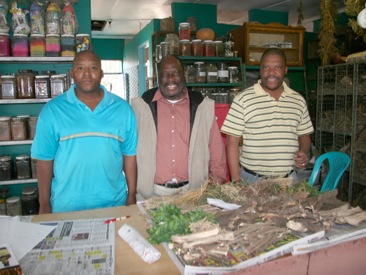4. The ‘African Chemist’ Shop, by Aukram Burton
Most healing and health maintenance work is done at home, without professional supervision, by people medicating themselves and their families and friends with substances obtained from grocery stores, clinics, hospitals, inyangas' “surgeries,” pharmacies, “African chemist” shops, and street-side muthi vendors.

Photo taken during a tour of the traditional medical practice of Protus Cele, an Inyanga in the Umlazi Township outside Durban, South Africa. (Photo by Aukram Burton)
In South Africa there are four categories of healers. There are the Inyangas (herbalists or traditional doctors). The Inyanga is a person who uses herbal and other medicinal preparations for treating disease. The Inyangas dispense natural healing products based upon ancient wisdom. This wisdom is widely considered to constitute a system of knowledge which, in the interest of cultural equity, must be considered as valuable as any other, particularly that of “Western” science.
Then there are the Sangomas (diviners). Sangomas are trained to communicate with and utilize the powers of ancestors in diagnosing a disease or mishap.
The Sangoma is considered the sacred guardian of spiritual tradition participating in age-old rituals of the ancestors. Another category includes the traditional birth attendants (ababelekisi) who are usually elderly women who have been midwives for years and are highly respected for their obstetric expertise. Lastly, there are the traditional surgeons (iingcibi). They are usually trained men with experience in conducting traditional circumcision.

Photo taken inside the office of Protus Cele. The portrait behind him is a painting of his father who was an Inyanga who started the family business in 1938 in downtown Durban. The “Groups Areas Act,” created under an Apartheid government in 1950 assigned racial groups to different residential and business areas, forcing Cele’s father to relocate the business to Umlazi where it has been in operation for the past 57 years. (Photo by Aukram Burton)

Protus Cele with his two sons who run the day-to-day operations of the business allowing him to be more active in Mwelela Kweliphesheya (Traditional Healers' Council). Mwelela Kweliphesheya is a development arm of KwaZulu- Natal Indigenous Healers that includes the Umgogodla Wesizwe Trust, an HIV/AIDS task team directing efforts to improve the care and treatment of South Africans with HIV/AIDS. The Council is working closely with the Nelson R. Mandela School of Medicine/University of KwaZulu-Natal in Durban in an effort to build bridges and improve collaboration with traditional healers caring for people with HIV/AIDS. (Photo by Aukram Burton)
